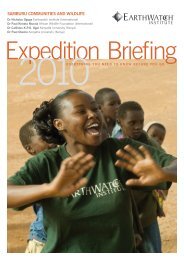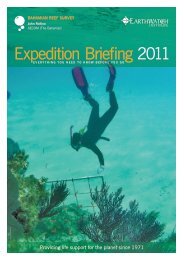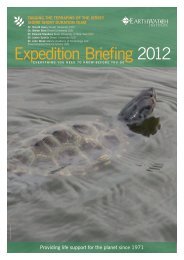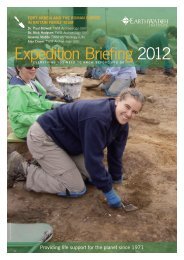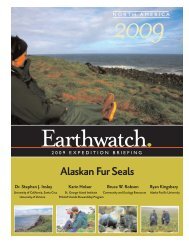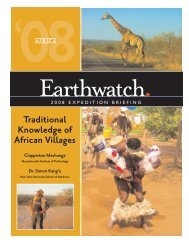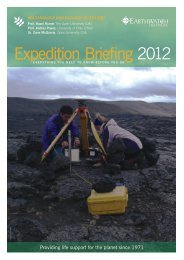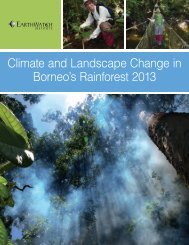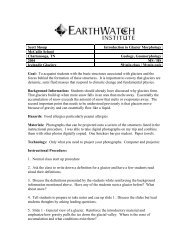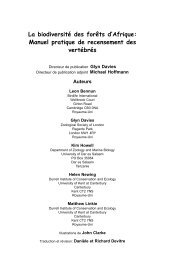Fiji's Ancient Seafarers Dr. Patrick D. Nunn - Earthwatch Institute
Fiji's Ancient Seafarers Dr. Patrick D. Nunn - Earthwatch Institute
Fiji's Ancient Seafarers Dr. Patrick D. Nunn - Earthwatch Institute
You also want an ePaper? Increase the reach of your titles
YUMPU automatically turns print PDFs into web optimized ePapers that Google loves.
Potential Hazards<br />
Hazard Type<br />
Transportation<br />
Terrain<br />
Animals/<br />
Plants<br />
Climate/<br />
Weather<br />
Personal<br />
security<br />
Project tasks/<br />
equipment<br />
Diseases and<br />
health risks<br />
Associated Risks and Precautions<br />
Vehicles drive on the left side of the road in Fiji. Paved roads are well maintained and<br />
regulated. The project will use a reputable rental company and drivers for the bus ride from<br />
Nadi to the project site. Seatbelts should be worn at all times per Fiji law. While in the field,<br />
project and village vehicles (usually a small pickup truck fitted with bench seats in the back<br />
and a canopy overhead) will be used to transport volunteers between the village and the<br />
research site along dirt roads, traveling no more than 10 miles per hour for typically 10<br />
minutes each way.<br />
The terrain is rough but reasonably easy to cross. Sprains, scratches, bruises, etc. are possible<br />
but can be minimized by following onsite safety procedures, particularly by walking slowly<br />
and carefully and wearing long pants. You should wear shoes at all times to avoid cutting your<br />
feet on shells and other sharp. Be sure to wash and apply an antibiotic cream to any cuts. When<br />
walking through the bush, beware of sinkholes in bedrock terrain. Barbed wire surrounds the<br />
Bourewa dig site and many farmers’ fields – cross it with great care and ask for help if you<br />
need it. Do not break down fences or leave gates open. A flashlight or headlamp is highly<br />
recommended for nighttime toilet visits. When crossing excavation areas, watch for ropes<br />
holding up tarps, guide wires for pits, and the pits themselves. Never jump into pits, and<br />
always be careful when getting out that you do not collapse the pit sides. Ask for a helping<br />
hand if necessary.<br />
There are no venomous snakes or other animals in the research area. Mosquitoes and hornets<br />
may be a problem in thick bush. Bring insect repellent and appropriate medications for<br />
potential allergic reactions to insects or plants (at least two Epi-pens, antihistamines, etc.).<br />
Scratches from sugarcane stalks are likely but can be minimized by wearing long pants.<br />
Do not expose yourself to the sun unnecessarily. Always wear a broad-brimmed hat when<br />
working in the sun and use ample high-factor sunscreen, reapplying frequently. You may also<br />
wish to bring a cream for relieving sunburn. Dehydration can be a significant issue, so be sure<br />
to drink plenty of water every day, particularly during fieldwork.<br />
Theft is not generally a concern in Vusama, although you should take sensible precautions and<br />
leave any unnecessary valuables at home. Walking alone in Fiji’s urban centers at night is not<br />
recommended as pick-pocketing and muggings do occasionally occur. Travel in groups and by<br />
taxi in urban areas at night; only choose official taxis with yellow registration plates.<br />
Follow proper procedures when using equipment, as instructed by the project staff. In order to<br />
protect personal electrical equipment from damage, power surge protectors and voltage<br />
adaptors are necessary.<br />
Vusama’s well water may cause stomach upsets (including diarrhea) for some people.<br />
Ultraviolet light (UV) treated water will be provided but has a slight taste (see Section 8 ‘Food’).<br />
Bring some medication such as Imodium (loperamide) or lomotil in case of traveler’s diarrhea.<br />
Adequate fluid intake is essential. Always wash your hands before eating and wear footwear<br />
at all times to avoid bacteria, disease and infection. Dengue fever is found in Fiji; it is a virus<br />
spread by day-biting mosquitoes and precautions such as wearing insect repellent should be<br />
practiced. Other diseases that may be found in Fiji include eosinophilic meningitis, hepatitis,<br />
HIV/AIDS, leptospirosis, and typhoid. Please see Section 11 ‘Health Information’ for inoculation<br />
recommendations and health advice.<br />
Medical Conditions of Special Concern<br />
Though the expedition will not be particularly physically strenuous, volunteers should be reasonably fit and<br />
healthy. You should be able to comfortably sit on the floor (cross-legged or kneeling with your feet tucked behind<br />
you) for extended periods during meals and social events (the welcome ceremony, chatting with village residents,<br />
etc.). People with limited flexibility, knee problems and/or bad backs may find this difficult. Though the team<br />
will eat a good deal of seafood, those with seafood allergies can be accommodated.<br />
17



